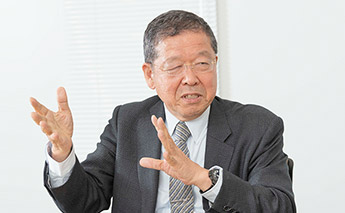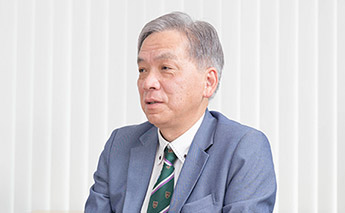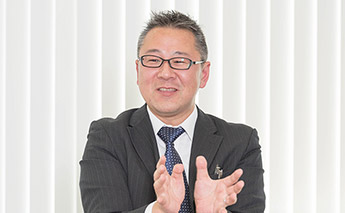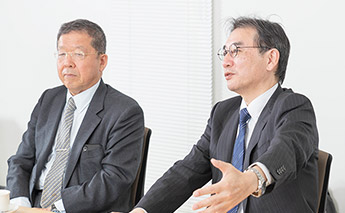Interview Date: April 2018
Partner Roundtable Sales Edition Part 1Salesmen’s talk
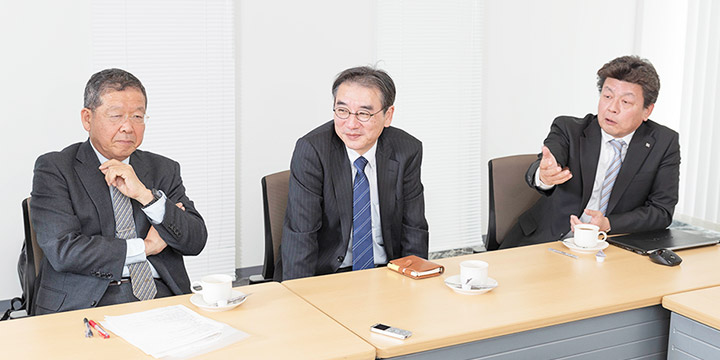
Benefits of Sales Centered on FLEXSCHE

Please tell us about your involvement with FLEXSCHE.
-
 YJP Sasaki
YJP Sasaki
-
Our company became a partner when FLEXSCHE was first released. We now have a department in charge of production schedulers. While we also handle ERP in our sales activities, about 80% of my work is related to FLEXSCHE sales.
-
 KSI Nakai
KSI Nakai
-
Our company is a subsidiary of Kubota Corporation, and we handle all of its systems. We started handling FLEXSCHE after hearing that a certain Kubota division wanted to use it. In external sales, we also handle our own production management systems and products from other vendors, and over 30% of my work is related to FLEXSCHE.
-
 ACT Katayama
ACT Katayama
-
Our company has been handling FLEXSCHE for 13 years. Initially, we focused on the CAD business, but gradually shifted, and now most of our new business deals involve FLEXSCHE. Therefore, most of my sales activities are related to FLEXSCHE. We have now developed and sell a production and process management system package called 'APICT' based on FLEXSCHE.
-
 UIS Otsuka
UIS Otsuka
-
Since joining the company, I have been dedicated to sales activities for FLEXSCHE. As a company, we are currently focusing on the manufacturing industry and also handle production management systems, but we center our sales around FLEXSCHE.
-
 MSI Watanabe
MSI Watanabe
-
In the department I belong to, which specializes in the manufacturing industry, acquiring new customers is a major challenge, and it's important to leave a strong impression on them. Unlike production management systems that all look the same, FLEXSCHE has a strong impact, making it a breakthrough for creating business opportunities. Therefore, the presence of FLEXSCHE is helpful in most sales activities.
-
 JCS Miyazawa
JCS Miyazawa
-
We have a similar stance to MSI. When conducting sales activities focused on the manufacturing industry, we concentrate solely on FLEXSCHE during the approach phase, but it can also lead to uncovering other business opportunities.
Does introducing FLEXSCHE make sales activities easier?
-
 MSI Watanabe
MSI Watanabe
-
Yes, that's right. We conduct sales activities mainly in the Tohoku region, but in rural areas, it's rare for factories to use production schedulers. We explain what a production scheduler is, and that serves as a starting point for subsequent business discussions.
-
 JCS Miyazawa
JCS Miyazawa
-
With common solutions, it's hard to get attention, but we can break through with FLEXSCHE, and it can eventually lead to other business opportunities.
-
 ACT Katayama
ACT Katayama
-
After all, the visual aspect stands out. The response is good, and just a little movement can pique interest.
-
 KSI Nakai
KSI Nakai
-
With production management systems, they all look the same, so in that regard,FLEXSCHE can make an impact with its dynamic screens.
-
 MSI Watanabe
MSI Watanabe
-
Moreover, when we listen to the challenges our customers face, most of them cannot be solved with just a production management system, and in fact,they can be solved with a production scheduler.That's precisely why we make FLEXSCHE the pillar of our sales activities.
-
 UIS Otsuka
UIS Otsuka
-
Trying to compete with production management systems is tough because there are many competitors, the scale is too large, and honestly, it's hard to win in a competition. In that regard,if you have engineers with solid FLEXSCHE know-how, you can compete anywhere with a production scheduler.That's why.
-
 JCS Miyazawa
JCS Miyazawa
-
With FLEXSCHE, the possibilities of associating with top-tier companies, which you might hesitate to contact, expand.
-
 ACT Katayama
ACT Katayama
-
That's right.Even with projects that large local SIers cannot meet the demands of, we can handle them with FLEXSCHE,and in such cases, it feels like we've outsmarted them.
-
 MSI Watanabe
MSI Watanabe
-
As a salesperson, I'm always pleased when there's an inquiry about FLEXSCHE. Projects involving production management systems take more time to propose than FLEXSCHE, and there are more competitors.
-
 ACT Katayama
ACT Katayama
-
It's the same with any project; if we don't secure the order, the sales costs just pile up.
-
 MSI Watanabe
MSI Watanabe
-
In that regard, with FLEXSCHE, if we do a demo and say, "Please take a look," the benefits are immediately apparent, and the likelihood of securing the order is high.
Demonstrations in FLEXSCHE Sales
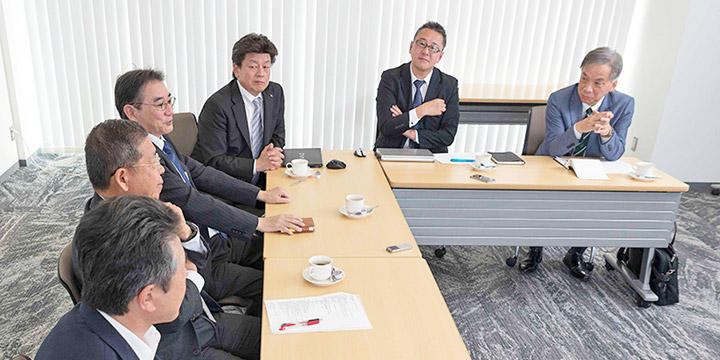
Does the fact that the benefits are immediately apparent mean you conduct demos from the early stages of negotiations?
-
 UIS Otsuka
UIS Otsuka
-
We don't usually start with a demo. Even when there's an inquiry, we first ask why they want a production scheduler. The first step in negotiations is to clarify whether FLEXSCHE is truly the right tool to solve the customer's challenges. In some cases, another solution might actually be more beneficial for the customer than FLEXSCHE.
-
 KSI Nakai
KSI Nakai
-
For example,If they want to shorten lead times or if planning seems challenging, then it becomes, "Well, FLEXSCHE is the answer."Based on what we hear, we often propose a demo for the next meeting.
-
 YJP Sasaki
YJP Sasaki
-
I often conduct demos right away. I prepare data tailored to the customer's industry in advance, and after showing it, I ask if it suits their needs. If they are convinced, the speed of negotiations increases.
-
 MSI Watanabe
MSI Watanabe
-
Usually, I listen to the customer first, but I'm always prepared to show a demo.
Do you all often conduct demos yourselves?
-
 ACT Katayama
ACT Katayama
-
I'm not very good at it, so I often do it with an engineer. Showing a poor demo can have the opposite effect (laughs). If you can demo smoothly in conversation, it opens the customer's heart.
So, do you also do simple prototyping while listening to the customer?
-
 ACT Katayama
ACT Katayama
-
Sometimes we do. If it can be done quickly, it leads to good negotiations.
-
 KSI Nakai
KSI Nakai
-
I also do demos, but it's not easy to do them well.
-
 MSI Watanabe
MSI Watanabe
-
That's true. A demo that just shows data is easier, but if it's interactive with the customer, the salesperson needs a certain level of system knowledge to do it well. In our company, it's not uncommon for a sales trip to take three hours one way, so we want to be able to do it to some extent.
-
 YJP Sasaki
YJP Sasaki
-
During a demo, issues the customer doesn't understand or hasn't noticed become clear, so demos are important. The depth of the hearing also changes with the demo.
-
 JCS Miyazawa
JCS Miyazawa
-
It would be ideal if salespeople could do it to a certain level, even if not as well as engineers. Once negotiations reach a certain stage, engineers must accompany them.
The Challenges of Handling FLEXSCHE
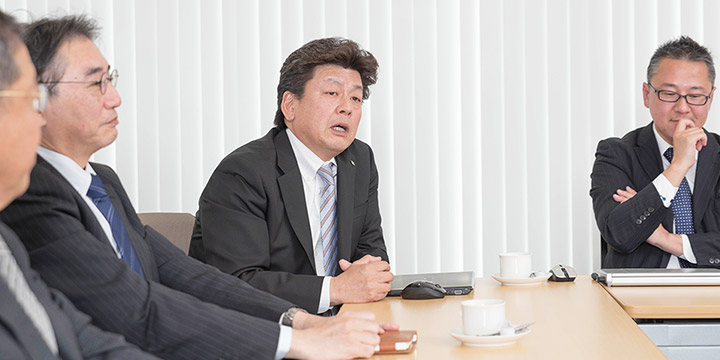
Please tell us about the points you pay attention to during the negotiation process.
-
 UIS Otsuka
UIS Otsuka
-
Because it's such a great product, the scary part is that it might be seen as a "magic box." What used to take people dozens of hours of overtime can now be done with the push of a button, but it requires a vast amount of data to make that possible. Especially for small and medium-sized enterprises, this doesn't seem to resonate.We make sure to convey that "it's a dream tool, but you need to master it properly."If we carelessly say, "It can do anything!" we'll get scolded by our engineers later...
-
 MSI Watanabe
MSI Watanabe
-
Exactly,It's not a magic tool, so a dedicated person is essential for implementation, and there are many things the customer needs to do for the setup..
-
 ACT Katayama
ACT Katayama
-
Recently, it's often mistaken for AI. It's not; it's a tool based on the data you input, so we need to clear up that misunderstanding.
-
 YJP Sasaki
YJP Sasaki
-
Some people perceive FLEXSCHE as a management system, but it's more like a calculator that performs calculations.
-
 JCS Miyazawa
JCS Miyazawa
-
It's important to clearly explain what a production scheduler is and help them understand its benefits.
-
 YJP Sasaki
YJP Sasaki
-
I think it's important to know the position of the person you're negotiating with. For example, in a demo,If you show too many features to someone who actually has to master it, they might think it's too complex and give it a negative evaluation. In reality, it's a system with good operability and ease of use.
-
 MSI Watanabe
MSI Watanabe
-
It's important to know which department within the company the inquiry came from. If the negotiation comes from the manufacturing site, they are very cooperative with the implementation work, making the project progress smoothly. However, if it requires approval from the site, it takes a considerable amount of time to get internal approval and secure the order.
On the other hand, if the inquiry comes from the management level, once they understand the appeal of FLEXSCHE, the process to secure the order is shorter, allowing for a speedy start to the implementation work. However, if the people on the ground are left behind in this process, they may not understand FLEXSCHE and may not actively cooperate with the implementation work, so it's essential to communicate with them as early as possible.
-
 YJP Sasaki
YJP Sasaki
-
When the management and the people on the ground are united in the inquiry, everything tends to go smoothly.The cooperation of the people on the ground is indispensable, and getting them to agree to use FLEXSCHE is very importantI feel.
The Future Importance of FLEXSCHE
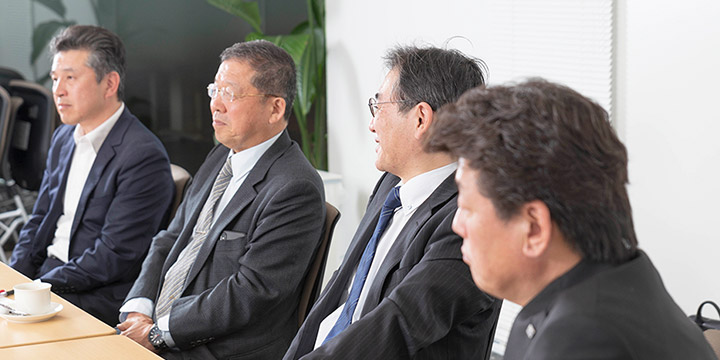
Please tell us about the impact handling FLEXSCHE has had on your business.
-
 ACT Katayama
ACT Katayama
-
When our company was founded in 1994, the CAD business was our main focus. However, we couldn't add much value to the products, resulting in a low-margin business. We were exploring new styles for ourselves,but after encountering FLEXSCHE and focusing on it, we were able to enhance our employees' skills and become a company with distinctive features.We developed our own unique business model.
-
 KSI Nakai
KSI Nakai
-
Since FLEXSCHE doesn't do direct sales, it was significant that we started receiving project introductions from manufacturers.The adoption of FLEXSCHE led to securing orders for core systems and production management systems, significantly changing our sales style.
-
 YJP Sasaki
YJP Sasaki
-
Amidst claims of low labor productivity in Japan,if you aim for a higher level of production with the same equipment and personnel, FLEXSCHE becomes an important tool.The value created by incorporating excellent production planning becomes immediately visible. It's very rewarding for our company to contribute to the manufacturing industry in this way.
-
 MSI Watanabe
MSI Watanabe
-
Before handling FLEXSCHE, our company's business pillars were local governments and the construction industry. However, in the 2000s, those areas shrank, and we felt a sense of crisis that we might run out of work. That's when we started focusing on the manufacturing industry, and further,by encountering FLEXSCHE, we were able to build a business model specialized in the manufacturing industry.
-
 JCS Miyazawa
JCS Miyazawa
-
Our company's main pillar was originally the construction industry. We still generate a certain amount of revenue there, but by relatively early handling of FLEXSCHE in the region, we gained a unique weapon in the form of a production scheduler, and our sales destinations increased significantly. Although we struggled for a while,now we feel that we have become a company that is recognized as "such a company exists even in the region."I feel.
-
 UIS Otsuka
UIS Otsuka
-
I believe that by handling FLEXSCHE, engineers can gain a deep understanding and knowledge of the manufacturing industry. Since planning involves handling all processes from the beginning to the end of manufacturing, it comprehensively deepens understanding of the manufacturing industry. As our company focuses on the manufacturing industry,the deepening of engineers' knowledge about the manufacturing industry through FLEXSCHE is leading to further business development.
Thank you. How do you feel about the future attention towards FLEXSCHE?
-
 MSI Watanabe
MSI Watanabe
-
Ifeel that business negotiations have increased since the call for "work style reform" began.How about everyone else?
-
 JCS Miyazawa
JCS Miyazawa
-
I'm not sure if that's the trigger, but it's certainly increasing.
-
 KSI Nakai
KSI Nakai
-
Is that actually becoming a keyword in business negotiations?
-
 MSI Watanabe
MSI Watanabe
-
Yes, previously, many business negotiations focused on themes like inventory reduction and lead time shortening, butrecently, there are many discussions about wanting to manage the workload of planners.Indeed, there are also more cases where the planners themselves are raising their voices.
-
 ACT Katayama
ACT Katayama
-
Such discussions are indeed increasing. While focusing solely on that makes it difficult in terms of cost, it can lead to orders if we can appeal to various benefits as a result.
-
 KSI Nakai
KSI Nakai
-
It leads to reform not only for planners but also in terms of the work style of the entire factory.Accurate scheduling can reduce unnecessary overtime and sudden overtime.
-
 UIS Otsuka
UIS Otsuka
-
I think one of the challenges faced by recent manufacturers is the difficulty in recruitment.Companies with a lot of unnecessary overtime, in other words, companies that have not implemented work style reform, do not attract talent. FLEXSCHE is the tool that can solve that challenge.
-
 MSI Watanabe
MSI Watanabe
-
For our main customers, small and medium-sized enterprises, especially in regions like Tohoku, recruitment is a major challenge. Moreover, planning tasks cannot be done without talented personnel. I believe we are entering an era where we will increasingly rely on IT to solve labor shortages and skill shortages. Therefore,I expect that orders for FLEXSCHE will continue to grow.I am hopeful.
-
 JCS Miyazawa
JCS Miyazawa
-
Since our company also conducts business mainly in Joetsu, we have many small and medium-sized enterprise customers. Many people are not familiar with the term production scheduler, and yet,in many cases, the challenges they face seem to be solvable with FLEXSCHE.That's the case.
-
 YJP Sasaki
YJP Sasaki
-
The market is still large, isn't it?
-
 KSI Nakai
KSI Nakai
-
Recently, not only work style reform but also keywords like IoT and Industry 4.0 have become tailwinds. I believe that government subsidy programs can also be a factor in adopting FLEXSCHE.
-
 MSI Watanabe
MSI Watanabe
-
Subsidies aimed at improving the productivity of domestic industries were often used for production equipment until recently, but I feel that they will be considered for IT as well in the future.
-
 JCS Miyazawa
JCS Miyazawa
-
The names of such subsidy programs change every year, and they are complex, aren't they? I would like to introduce advantageous subsidies during business negotiations.

